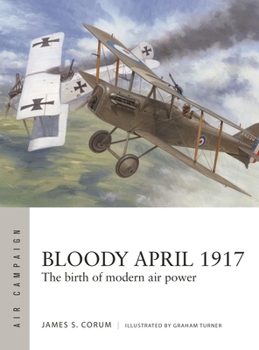Bloody April 1917: The Birth of Modern Air Power
Select Format
Select Condition 
Book Overview
Researched from original-language primary sources, this is a uniquely well-informed and multi-faceted history of the World War I air campaign of Bloody April.
Researched from original German-, French-, and English-language sources, and written by an authority on both air and ground military operations, author, Dr James S Corum examines how Bloody April caused Allied forces to reassess their approach to the use of airpower. Considering well-known problems such as technology and training doctrine, but also how the artillery-aircraft combination ideally had to work in late-WW I ground offensives, Dr Corum analyses what each side got wrong and why. He describes little-known parts of the April campaigns, such as both sides' use of strategic bombing with heavy aircraft, and considers the German use of advanced high-altitude reconnaissance aircraft with oxygen and heated suits while detailing the exploits of the infamous 'Red Baron', Manfred von Richthofen. Lessons from Bloody April not only served to improve the coordination of Allied artillery and aircraft but subsequently aircraft played a much larger role in supporting ground troops in attack mode. Bloody April paved the way for the airpower revolution that, by 1918, would make the Allies masters of the sky on the Western Front.Format:Paperback
Language:English
ISBN:1472853059
ISBN13:9781472853059
Release Date:November 2022
Publisher:Osprey Publishing (UK)
Length:96 Pages
Weight:0.68 lbs.
Dimensions:0.3" x 7.3" x 9.7"
Related Subjects
HistoryCustomer Reviews
0 rating





